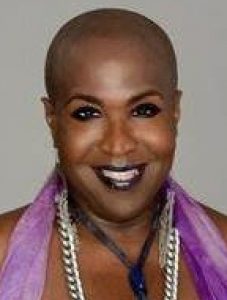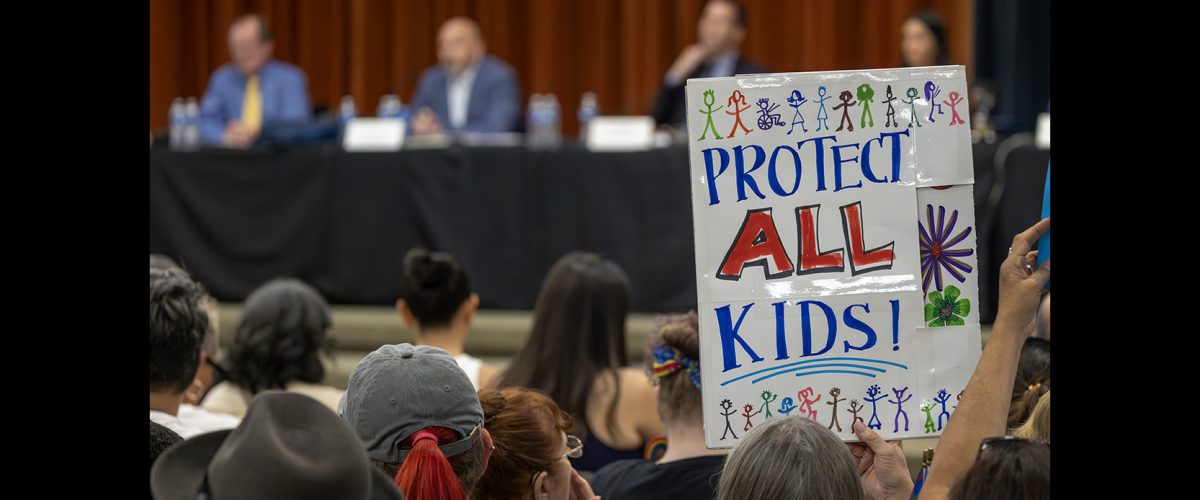Trans medical expert Fan Liang said there are way too many misconceptions about gender-affirming health care to share during a single panel discussion about the mistreatment of transgender people in the United States.
“So, I’m just going to hit on some of the larger or more common misperceptions,” said Liang, medical director at the Johns Hopkins Center for Transgender and Gender Expansive Health. “There is this commonly held belief that trans care is somehow experimental, or it’s not couched in research, that it’s not couched in science, and that it’s really only been an issue for the past five to maybe 10 years. And I will say that transgender and nonbinary patients and individuals have been around since antiquity. And it’s been documented across cultures all around the world.”

Fan Liang
Liang offered her perspective during a July 27 roundtable organized and livestreamed from Washington, D.C., by NMAC, formerly known as the National Minority AIDS Council, and its Coalition for Justice and Equality Across Movements. Panelists included Democratic members of Congress, trans rights advocates and policy experts focused on right-wing conspiracy theories that vilify and inspire violence against the LGBTQ community.
Liang asserted that gender-affirming care is medically sound despite conservatives’ claims to the contrary.
“The process by which patients undergo evaluation and care has been vetted and supported by research spanning over 40 years, across thousands of publications. And it’s by merit of these research endeavors that the American Medical Association, the American Academy of Pediatrics and the American College of Physicians have created these guidelines for trans care and for all other aspects of medical care around the country,” she said.
“The process by which patients undergo evaluation and care has been vetted and supported by research spanning over 40 years”
Another popular misconception perpetuated and exploited by the anti-trans movement is that gender-affirming care is provided hastily and carelessly to anyone who asks for it, she added. “There is this misperception that access to care is quick and that anyone can just get hormones or surgery on a whim, and that really can’t be any further from the truth. Access to trans care is an incredibly difficult issue with demand.
“Children and adolescents need to be seen by a multidisciplinary team, and patients are waiting years for treatment. It’s not uncommon for my surgical patients to be waiting for a year, two years, three years, four years. And on the day of surgery, they will say to me, ‘Dr. Liang, I can’t believe this day is finally here.’”

Toni Newman
But the political climate in statehouses and in Congress is making gender-affirming care dangerously difficult to get, said Toni Newman, director of the NMAC coalition.
“We are fighting for health equity for all, especially the transgender community across this country. Too many politicians are trying to score cheap political points by attacking transgender Americans with health care and transgender rights,” Newman said.
According to the Human Rights Campaign, at least 20 states have passed laws or policies banning such care. But Newman said the anti-equality movement wants much more. “More than 220 laws directly targeting trans Americans have been introduced and more are being unveiled every day. These cruel laws are endangering the dignity and health of tens of thousands of transgender Americans.”
“These cruel laws are endangering the dignity and health of tens of thousands of transgender Americans.”
As a result, the American LGBTQ community finds itself in a “very dangerous moment in time” because anti-equality rhetoric often inspires physical violence, said Susan Corke, director of the Intelligence Project at the Southern Poverty Law.

Susan Corke
“Trans persons have been murdered in shocking acts of violence allegedly motivated by hard-right conspiracy theories, and LGBTQ persons were already disproportionately experiencing violent victimization,” she explained. “Yet instead of support, they are targeted by efforts between right-wing extremist groups and some MAGA Republicans to spread misinformed, conspiratorial, violent rhetoric.”

Barbara Lee
Even the introduction of laws banning or limiting gender-affirming medical care has been shown to contribute to wider hostility against trans people, said U.S. Rep. Barbara Lee, D-Calif., a member of the Congressional Equality Caucus.
Anti-trans measures are “dangerous and they further perpetuate violence and discrimination,” Lee said. “What we should be doing is introducing bills that expand equity and justice and health care for the transgender community. Instead, these bills take us back. We can’t accept this. This is not the nation we want to build. No person should fear for their safety or have unequal rights. And as an African American woman, I get it at a very deep and personal level.”
Lee added she has been appalled to witness extreme hostility in Congress toward transgender people this year: “We have got to beat back these dangerous bills that are anti-trans that are coming forward now in every committee. As a member of the (House) appropriations committee, it has been horrendous to hear the debate of some of the MAGA extremist Republicans who really don’t care about what they say about the transgender community.”
“It has been horrendous to hear the debate of some of the MAGA extremist Republicans who really don’t care about what they say about the transgender community.”

Sara Jacobs
U.S. Rep. Sara Jacobs, D-Calif., a member of the House Armed Services Committee, chided Republicans for seeking to tie abortion and transgender care issues to military spending.
“It was really disheartening to me that instead of debating real issues and working toward ensuring our national security in the National Defense Authorization Act, my colleagues used that time to ban gender-affirming care, drag shows and pride flags, and to demean the trans community in how they were talking about it.”
The anti-trans movement in Congress has become so “obscene” in its tactics that Republicans once supportive of the Equality Act have backed away, said U.S. Rep. Mark Takano, D-Calif., co-chair of the Congressional Equality Caucus.
If passed, the act would amend the 1964 Civil Rights Act to include a prohibition of discrimination based on sexual orientation or gender identity. “They just won’t co-sponsor the bill any more. And it’s because there’s this unified party line that’s been adopted on ‘thou shalt be anti-trans,” Takano said.

Mark Takano
The challenge is to connect with those who can be persuaded to support LGBTQ equality and to explore “how do we lower the temperature with people who have been fed a lot of misinformation? And that’s what I am trying to get better at. Because as the lead sponsor of the bill, that’s what I have to do. We have to go and work in these communities to transform their thinking.”
And the thinking that has to be changed includes an apparent fear among conservatives that being gay or transgender is something that can be caught by reading books or listening to classroom lessons, he said.
“That’s the premise of why they’re banning books. They think, ‘Oh, you read a book and you’re going catch trans’ or a teacher talking about trans is going turn your kid trans, which is crazy. Part of the conversation we have to have with people is that we were born this way. It’s not like we’re like deciding these things. This is part of the great diversity of nature.”
Related articles:
Transgender community living in fear, two trans pastors testify
Why being transgender is not a sin | Opinion by Mark Wingfield
The transgender obsession | Opinion by Martin Thielen
The church needs a better story than living in fear | Opinion by Mark Wingfield and Amber Wylde
Seven things I’m learning about transgender persons | Opinion by Mark Wingfield
More people are ‘detransitioning’ from church than from transgender identity | Analysis by Rodney Kennedy
Focus on the Family affiliate is the unifying force behind campaign to restrict transgender rights


